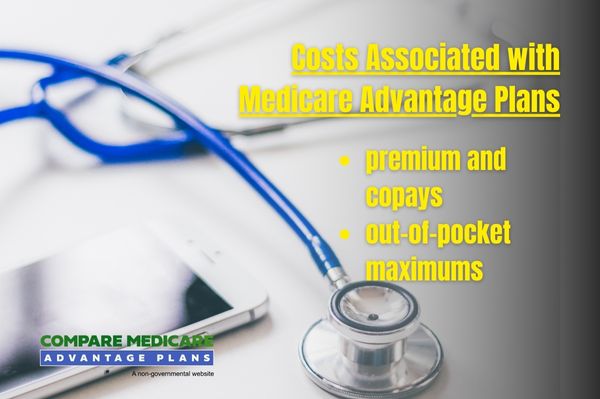




Medicare Advantage Plans Pennsylvania 2026
Wondering about the potential Medicare Advantage plans in Pennsylvania
Key Takeaways
- Some Pennsylvania Medicare Advantage Plans may offer additional services such as vision, dental, and hearing coverage.
- The main types of Medicare Advantage plans available in Pennsylvania include Health Maintenance Organization (HMO) plans, Preferred Provider Organization (PPO) plans, and Special Needs Plans (SNPs), each catering to different healthcare needs.
- Enrollment in Medicare Advantage plans occurs during specific periods, including the Open Enrollment Period and the Annual Election Period, requiring beneficiaries to be aware of these timelines for making coverage changes.
Compare Plans in One Step!
Enter Zip Code
Understanding Pennsylvania Medicare Advantage Plans 2026

Medicare Advantage plans, also known as Medicare Part C, are provided by private insurers approved by Medicare. These plans could act as an alternative to Original Medicare by covering all services offered under Medicare Parts A and B, and sometimes include additional benefits such as vision, dental, and hearing services. Eligibility generally requires enrollment in Medicare Parts A and B, so beneficiaries should compare plans carefully to find one that suits their needs.
Certain Medicare Advantage plans may include prescription drug coverage, while Original Medicare does not, likely necessitating separate Part D coverage for medications. These plans must adhere to Medicare regulations, which will likely result in variations in coverage and costs among different plans.
Types of Pennsylvania Medicare Advantage Plans Available
Pennsylvania will likely offer a variety of Medicare Advantage plans to meet the diverse needs of its residents. The main types of plans available include Health Maintenance Organization (HMO) plans, Preferred Provider Organization (PPO) plans, and Special Needs Plans (SNPs). Each type of plan has unique features and benefits, so Medicare beneficiaries should understand their options.
HMO Plans
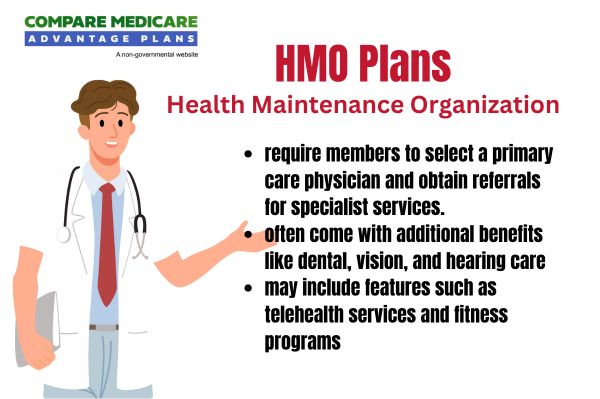
Health Maintenance Organization (HMO) plans may offer lower costs but require members to use a specified network of healthcare providers. This means that patients must obtain referrals from their primary care physician to see specialists, which could be a downside for those who prefer direct access to specialist care.
In-network care is mandatory for HMO plan members, except in emergencies or for certain out-of-network situations. Some HMO plans might offer premiums, although members must still pay their Medicare Part B premium. This cost structure could make HMO plans a budget-friendly choice for those willing to navigate the potential network restrictions.
PPO Plans
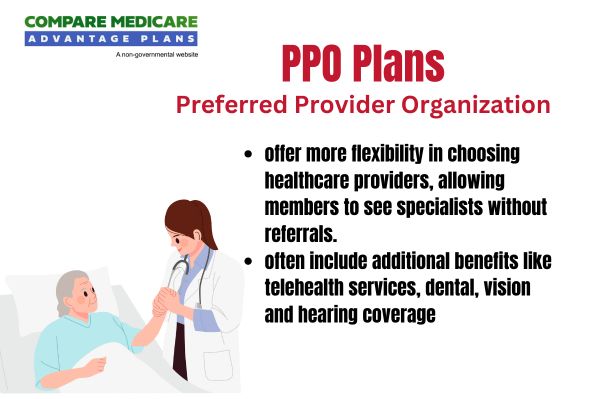
Preferred Provider Organization (PPO) plans offer greater flexibility in choosing healthcare providers and do not require referrals for specialist visits. PPO plans may include both in-network and out-of-network coverage options, allowing members to see any doctor they choose. This flexibility comes at a cost, as PPO plans typically have higher premiums compared to HMO plans due to their broader provider access.
Members of PPO plans can receive out-of-network care, which might be more expensive than in-network services. This could make PPO plans a good option for those who prioritize flexibility and comprehensive care.
Special Needs Plans (SNPs)
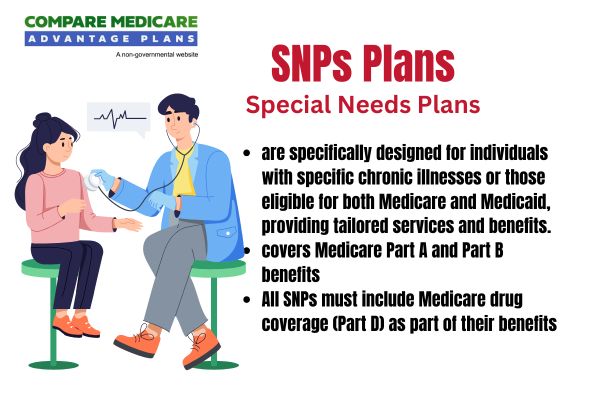
Special Needs Plans (SNPs) are tailored Medicare Advantage plans designed specifically to serve individuals with specific health needs, such as chronic conditions, disabilities, or those who require institutional care. These plans could potentially provide customized benefits and services to meet the unique requirements of their enrollees.
There are three main types of SNPs: Chronic Condition SNPs (C-SNPs), Dual Eligible SNPs (D-SNPs), and Institutional SNPs (I-SNPs), each focusing on specific populations. Eligible individuals must meet specific criteria to enroll in SNPs, including having a qualifying diagnosis or being dual-eligible for Medicare and Medicaid.
Overview of Pennsylvania Medicare Advantage Plans 2026
Pennsylvania Medicare Advantage plans will likely be designed to offer comprehensive healthcare coverage tailored to the unique needs of residents, possibly providing an alternative to traditional Medicare. Some plans may include additional benefits not typically covered under Original Medicare, such as vision, dental, and hearing coverage.
The Medicare Advantage plans in Pennsylvania will likely feature a variety of plan options, allowing beneficiaries to choose based on their healthcare needs and financial situations. These plans could enhance the accountability and quality of services provided by these plans, possibly ensuring that beneficiaries receive high-quality care.
Possible Services and Benefits
Medicare Advantage plans are required to cover all services available under Original Medicare, which includes hospital and medical services. Some plans may also include extra benefits such as vision, dental, and hearing services.
These potential benefits could cover services not typically included in Original Medicare, possibly making them an attractive option for those seeking comprehensive coverage.
Potential Benefits of Pennsylvania Medicare Advantage Plans 2026

Individuals enrolled in Pennsylvania Medicare Advantage Plans could potentially access additional benefits such as vision, dental, and hearing coverage that could go beyond Original Medicare. These plans include all services covered under Medicare Parts A and B, likely providing a more comprehensive health insurance option.
Enrollment Process for Pennsylvania Medicare Advantage Plans 2026
The enrollment process for Medicare Advantage plans in Pennsylvania is structured around specific periods when beneficiaries can sign up or make changes to their coverage. Individuals can switch from their current Medicare Advantage plan to another plan or revert to original Medicare during the annual enrollment period.
Being aware of these enrollment periods is crucial for making timely and informed decisions about healthcare coverage.
When to Enroll
Individuals can enroll in Medicare Advantage plans during designated enrollment periods, with the Open Enrollment Period occurring from January 1 to March 31 each year. During this period, existing Medicare Advantage beneficiaries can switch plans or revert to Original Medicare.
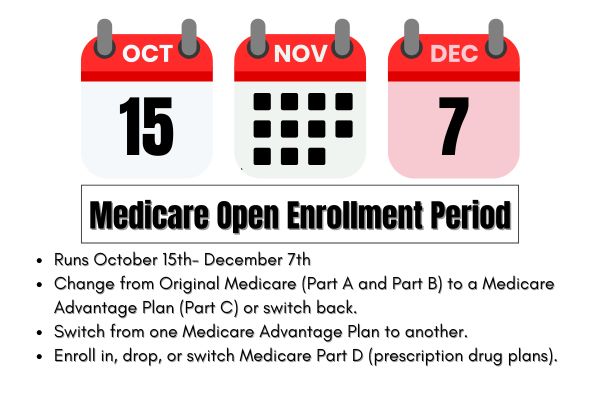
The Annual Open Enrollment Period (AOEP), which runs from October 15 to December 7 each year, is another critical time when beneficiaries can make changes to their coverage. Changes made during the AOEP take effect on January 1 of the following year.
For those new to Medicare, the Initial Enrollment Period starts three months before they turn 65 and lasts for seven months. During this time, individuals can sign up for Medicare without incurring penalties, and coverage begins the month they turn 65 if they enroll in the first three months.
Individuals with employer health coverage can use Special Enrollment Periods to delay Medicare enrollment without penalty until their coverage ends.
Different Enrollment Periods
Enrollment periods include the annual election period, open enrollment period, and special enrollment periods triggered by specific life events. For those who missed their initial enrollment, the General Enrollment Period runs from January 1 to March 31 every year.
These periods enable beneficiaries to adjust their coverage based on their evolving healthcare needs.
OEP, AEP, Special Enrollment
The Open Enrollment Period (OEP) allows individuals already enrolled in Medicare Advantage to switch plans or revert to Original Medicare, with changes effective the first day of the following month. This flexibility ensures that beneficiaries can adjust their coverage to better suit their healthcare needs without waiting for the next Annual Election Period (AEP) or Special Enrollment Period (SEP).
During the Special Enrollment Period, individuals may be eligible to enroll or change their Medicare Advantage plans outside the typical enrollment timeframes due to qualifying circumstances such as moving to a new area, losing other health coverage, or qualifying for Medicaid. Knowing the nuances of each enrollment period helps beneficiaries make informed decisions about their Medicare coverage.
Costs Associated with Pennsylvania Medicare Advantage Plans 2026
The potential expenses for Medicare Advantage plans in Pennsylvania may vary significantly based on a variety of factors, including plan type and coverage specifics. Beneficiaries should compare plans to find one that offers the best value for their healthcare needs.
Premiums and Co-Pays
Some Medicare Advantage plans may offer lower monthly premiums, but beneficiaries still need to pay their Medicare Part B premiums. Co-payments and coinsurance might differ depending on whether services are received from in-network or out-of-network providers.
Out-of-Pocket Maximums
Certain Medicare Advantage plan may offer a maximum limit on out-of-pocket expenses for certain services, which varies from plan to plan. Out-of-pocket maximums could be crucial for protecting beneficiaries from excessive healthcare costs in a given year. The out-of-pocket maximum for Medicare Advantage plans in Pennsylvania could potentially help limit the total expenses beneficiaries pay for covered services.
The out-of-pocket maximum for certain Medicare Advantage plans could play a significant role in determining the overall affordability of care for enrollees. Some Medicare Advantage plan may establish its own out-of-pocket maximum, which cannot exceed the limits set by federal regulations. This potential cap will likely be designed to protect beneficiaries from excessive costs by capping their total spending on services covered by the plan.
How to Qualify for Pennsylvania Medicare Advantage Plans 2026
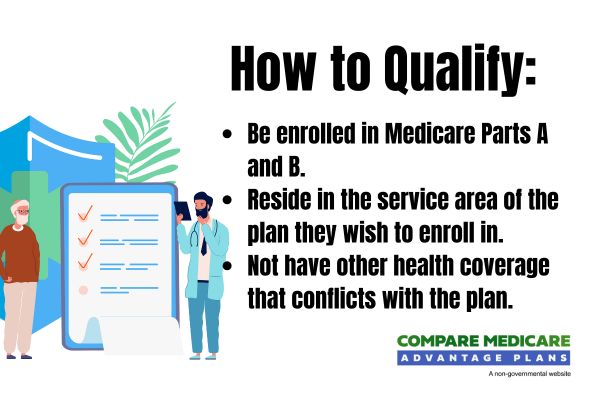
To qualify for Pennsylvania Medicare Advantage Plans, individuals must be enrolled in both Medicare Part A and Part B. Applicants must live in the service area of the Medicare Advantage plan they wish to join. Additionally, individuals must not be disqualified due to certain health conditions as per the guidelines of the Medicare Advantage plan.
Some plans may have additional requirements such as age or specific enrollment periods for new applicants. Applicants who qualify for Medicaid coverage may enroll in certain Medicare Advantage plans designed for dual-eligible, likely meeting their healthcare needs. Additionally, there will likely be various Medicare and Medicaid plans available to meet diverse healthcare needs.
Contracted Network and Access to Care
Medicare Advantage plans likely ensure high-quality coverage and eliminate unnecessary barriers to care, possibly focusing on strengthening prior authorization practices. Plans must provide clear information about their internal coverage criteria and ensure these criteria are publicly accessible.
Provider directories must be comprehensive and updated regularly to ensure beneficiaries can easily access information about available healthcare providers.
Comparing Pennsylvania Medicare Advantage Plans to Original Medicare
Some Pennsylvania Medicare Advantage plans may provide additional benefits compared to Original Medicare, such as vision, dental, and hearing coverage. These plans could potentially provide a more comprehensive healthcare solution for those looking for extra coverage beyond what may be offered by Original Medicare.
Coverage Differences
Medicare Advantage plans typically use a network of providers, which might limit coverage to specific doctors and hospitals, unlike Original Medicare, which allows broader access. Original Medicare does not cover routine dental or vision care, but some Medicare Advantage plans might include these services.
Original Medicare does not include prescription drug coverage, but certain Medicare Advantage plans might integrate this feature. Medicare Advantage plans may also require beneficiaries to use network providers, whereas Original Medicare allows more flexibility with provider choice.
Cost Comparisons
Medicare Advantage plans could potentially offer lower monthly premiums but may impose higher out-of-pocket costs for certain services compared to Original Medicare. Some Medicare Advantage plans may also have an out-of-pocket maximum for covered services. Premiums for Medicare Advantage plans may vary, whereas Original Medicare requires a monthly premium for Part B.
Emergencies and Referrals

Emergency services are typically covered in Medicare Advantage plans regardless of whether the provider is in-network or out-of-network. This likely ensures that beneficiaries can access urgent care without worrying about network restrictions. Some plans require referrals for specialist visits, particularly those structured as Health Maintenance Organizations (HMOs).
Members of Medicare Advantage plans can usually access urgent care services without needing a referral. If a plan’s network includes a doctor or facility, Medicare Advantage members might have to use those providers for non-emergency care.
Summary
Navigating the landscape of Pennsylvania Medicare Advantage Plans
Frequently Asked Questions
→ What are Medicare Advantage plans?
Medicare Advantage plans, or Medicare Part C, are private insurance plans approved by Medicare that cover all services under Medicare Parts A and B, sometimes with additional benefits like vision, dental, and hearing services. These plans could provide a comprehensive alternative to original Medicare.
→ When can I enroll in a Medicare Advantage plan in Pennsylvania?
You can enroll in a Medicare Advantage plan in Pennsylvania during the Initial Enrollment Period, the Open Enrollment Period from October 15 to December 7, or during Special Enrollment Periods due to specific life events.
→ What are the possible costs associated with Medicare Advantage plans?
Some Medicare Advantage plans may feature lower premiums, but beneficiaries still need to pay their Medicare Part B premium. Additional costs like co-pays and coinsurance may vary significantly between different plans.
→ What additional benefits could Medicare Advantage plans offer?
Some Medicare Advantage plans may include extra benefits like vision, dental, and hearing services, which Original Medicare does not cover. These potential benefits could enhance your overall healthcare experience.
→ Are emergency services covered under Medicare Advantage plans?
Yes, Medicare Advantage plans typically cover emergency services, regardless of whether the provider is in-network or out-of-network.

ZRN Health & Financial Services, LLC, a Texas limited liability company



